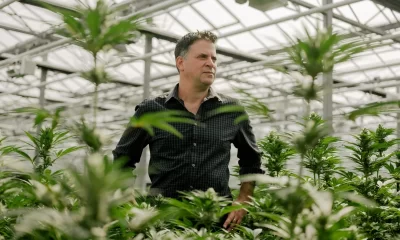Business
Pennsylvania Gov. Wolf Pardons Over 2,500, Nearly 400 for Nonviolent Cannabis Offenses

The governor’s pardons include 395 under a program for nonviolent cannabis offenses.
Many Pennsylvania residents with nonviolent cannabis offenses will be given a second chance, and the most recent batch of pardons is a promising and much-needed signal of relief.
In a Jan. 12 announcement, Gov. Tom Wolf granted 369 additional pardons, bringing his total to 2,540. Nearly 400 of those pardons were provided under an expedited review process for nonviolent cannabis-related offenses.
“I have taken this process very seriously—reviewing and giving careful thought to each and every one of these 2,540 pardons and the lives they will impact. Every single one of the Pennsylvanians who made it through the process truly deserves their second chance, and it’s been my honor to grant it,” said Gov. Wolf.
“A record prevents positive forward motion in a person’s life, and can spark a repetitive cycle of defeat. I firmly believe that with restored rights, pardoned Pennsylvanians prove themselves by stepping up and giving back to our communities.”
These 2,540 pardons are the most granted by a governor in the history of Pennsylvania. Before Gov. Wolf, Gov. Ed Rendell held the record with 1,122 pardons granted.
Among Gov. Wolf’s pardons, 395 of those were part of the expedited review process for nonviolent cannabis-related offenses and 232 were a part of the PA Marijuana Pardon Project.
In 2019, the Board of Pardons introduced and Lt. Gov. John Fetterman authorized the Expedited Review Program for Nonviolent Marijuana-Related Offenses, a program to speed up the pardon application process for people with nonviolent cannabis possession or paraphernalia convictions.
PA Marijuana Pardon Project is a one-time, large-scale pardoning project for people with select minor, non-violent cannabis criminal convictions. The project is spearheaded by Gov. Wolf and former Lieutenant Gov. Fetterman, and was announced on Sept. 1, 2022, providing a faster way of the process.
“Nobody should be turned down for a job, housing, or volunteering at your child’s school because of some old nonviolent weed charge, especially given that most of us don’t even think this should be illegal,” Fetterman said at the time. Fetterman now serves as U.S. senator from Pennsylvania after assuming office on Jan. 3.
In legal terms, a pardon constitutes total forgiveness by the state for a criminal conviction, regardless of whether the sentence included time in prison, and allows for expungement of the related criminal record. Applying for a pardon is free for individuals seeking clemency, and the change was made during the Wolf Administration. Under the administration, the pardons process was modernized so that the application process is more streamlined, and the application fees are now waived. The application can be downloaded online and the process does not require a lawyer.
A report released in 2020 by the Economy League of Greater Philadelphia—analyzing 10 years of pardons data—found that pardons contributed $16.5 million to Pennsylvania’s economy over the past decade at “no cost to anyone.”
The governor has shown consistent support for cannabis over the past several years, after coming around to it more recently. On Twitter in 2021, Gov. Tom Wolf reiterated his call to end pot prohibition in Pennsylvania. It’s a change in tune for Wolf, who in 2017 said that Pennsylvania wasn’t ready to legalize recreational pot use. Two of Pennsylvania’s neighbors, New Jersey and New York, helped push the state into adopting its own cannabis market.
Gov. Wolf has served for two terms in his leadership role. The governor’s Priorities for Pennsylvania is helping to fuel Pennsylvania’s economic comeback, and the latest round of pardons is helping to further improve his image.
Business
New Mexico cannabis operator fined, loses license for alleged BioTrack fraud

New Mexico regulators fined a cannabis operator nearly $300,000 and revoked its license after the company allegedly created fake reports in the state’s traceability software.
The New Mexico Cannabis Control Division (CCD) accused marijuana manufacturer and retailer Golden Roots of 11 violations, according to Albuquerque Business First.
Golden Roots operates the The Cannabis Revolution Dispensary.
The majority of the violations are related to the Albuquerque company’s improper use of BioTrack, which has been New Mexico’s track-and-trace vendor since 2015.
The CCD alleges Golden Roots reported marijuana production only two months after it had received its vertically integrated license, according to Albuquerque Business First.
Because cannabis takes longer than two months to be cultivated, the CCD was suspicious of the report.
After inspecting the company’s premises, the CCD alleged Golden Roots reported cultivation, transportation and sales in BioTrack but wasn’t able to provide officers who inspected the site evidence that the operator was cultivating cannabis.
In April, the CCD revoked Golden Roots’ license and issued a $10,000 fine, according to the news outlet.
The company requested a hearing, which the regulator scheduled for Sept. 1.
At the hearing, the CCD testified that the company’s dried-cannabis weights in BioTrack were suspicious because they didn’t seem to accurately reflect how much weight marijuana loses as it dries.
Company employees also poorly accounted for why they were making adjustments in the system of up to 24 pounds of cannabis, making comments such as “bad” or “mistake” in the software, Albuquerque Business First reported.
Golden Roots was fined $298,972.05 – the amount regulators allege the company made selling products that weren’t properly accounted for in BioTrack.
The CCD has been cracking down on cannabis operators accused of selling products procured from out-of-state or not grown legally:
- Regulators alleged in August that Albuquerque dispensary Sawmill Sweet Leaf sold out-of-state products and didn’t have a license for extraction.
- Paradise Exotics Distro lost its license in July after regulators alleged the company sold products made in California.
Golden Roots was the first alleged rulebreaker in New Mexico to be asked to pay a large fine.
Source: https://mjbizdaily.com/new-mexico-cannabis-operator-fined-loses-license-for-alleged-biotrack-fraud/
Business
Marijuana companies suing US attorney general in federal prohibition challenge

Four marijuana companies, including a multistate operator, have filed a lawsuit against U.S. Attorney General Merrick Garland in which they allege the federal MJ prohibition under the Controlled Substances Act is no longer constitutional.
According to the complaint, filed Thursday in U.S. District Court in Massachusetts, retailer Canna Provisions, Treevit delivery service CEO Gyasi Sellers, cultivator Wiseacre Farm and MSO Verano Holdings Corp. are all harmed by “the federal government’s unconstitutional ban on cultivating, manufacturing, distributing, or possessing intrastate marijuana.”
Verano is headquartered in Chicago but has operations in Massachusetts; the other three operators are based in Massachusetts.
The lawsuit seeks a ruling that the “Controlled Substances Act is unconstitutional as applied to the intrastate cultivation, manufacture, possession, and distribution of marijuana pursuant to state law.”
The companies want the case to go before the U.S. Supreme Court.
They hired prominent law firm Boies Schiller Flexner to represent them.
The New York-based firm’s principal is David Boies, whose former clients include Microsoft, former presidential candidate Al Gore and Elizabeth Holmes’ disgraced startup Theranos.
Similar challenges to the federal Controlled Substances Act (CSA) have failed.
One such challenge led to a landmark Supreme Court decision in 2005.
In Gonzalez vs. Raich, the highest court in the United States ruled in a 6-3 decision that the commerce clause of the U.S. Constitution gave Congress the power to outlaw marijuana federally, even though state laws allow the cultivation and sale of cannabis.
In the 18 years since that ruling, 23 states and the District of Columbia have legalized adult-use marijuana and the federal government has allowed a multibillion-dollar cannabis industry to thrive.
Since both Congress and the U.S. Department of Justice, currently headed by Garland, have declined to intervene in state-licensed marijuana markets, the key facts that led to the Supreme Court’s 2005 ruling “no longer apply,” Boies said in a statement Thursday.
“The Supreme Court has since made clear that the federal government lacks the authority to regulate purely intrastate commerce,” Boies said.
“Moreover, the facts on which those precedents are based are no longer true.”
Verano President Darren Weiss said in a statement the company is “prepared to bring this case all the way to the Supreme Court in order to align federal law with how Congress has acted for years.”
While the Biden administration’s push to reschedule marijuana would help solve marijuana operators’ federal tax woes, neither rescheduling nor modest Congressional reforms such as the SAFER Banking Act “solve the fundamental issue,” Weiss added.
“The application of the CSA to lawful state-run cannabis business is an unconstitutional overreach on state sovereignty that has led to decades of harm, failed businesses, lost jobs, and unsafe working conditions.”
Business
Alabama to make another attempt Dec. 1 to award medical cannabis licenses

Alabama regulators are targeting Dec. 1 to award the first batch of medical cannabis business licenses after the agency’s first two attempts were scrapped because of scoring errors and litigation.
The first licenses will be awarded to individual cultivators, delivery providers, processors, dispensaries and state testing labs, according to the Alabama Medical Cannabis Commission (AMCC).
Then, on Dec. 12, the AMCC will award licenses for vertically integrated operations, a designation set primarily for multistate operators.
Licenses are expected to be handed out 28 days after they have been awarded, so MMJ production could begin in early January, according to the Alabama Daily News.
That means MMJ products could be available for patients around early March, an AMCC spokesperson told the media outlet.
Regulators initially awarded 21 business licenses in June, only to void them after applicants alleged inconsistencies with how the applications were scored.
Then, in August, the state awarded 24 different licenses – 19 went to June recipients – only to reverse themselves again and scratch those licenses after spurned applicants filed lawsuits.
A state judge dismissed a lawsuit filed by Chicago-based MSO Verano Holdings Corp., but another lawsuit is pending.
Source: https://mjbizdaily.com/alabama-plans-to-award-medical-cannabis-licenses-dec-1/
-

 Business2 years ago
Business2 years agoPot Odor Does Not Justify Probable Cause for Vehicle Searches, Minnesota Court Affirms
-

 Business2 years ago
Business2 years agoNew Mexico cannabis operator fined, loses license for alleged BioTrack fraud
-

 Business2 years ago
Business2 years agoAlabama to make another attempt Dec. 1 to award medical cannabis licenses
-

 Business2 years ago
Business2 years agoWashington State Pays Out $9.4 Million in Refunds Relating to Drug Convictions
-

 Business2 years ago
Business2 years agoMarijuana companies suing US attorney general in federal prohibition challenge
-

 Business2 years ago
Business2 years agoLegal Marijuana Handed A Nothing Burger From NY State
-

 Business2 years ago
Business2 years agoCan Cannabis Help Seasonal Depression
-

 Blogs2 years ago
Blogs2 years agoCannabis Art Is Flourishing On Etsy













